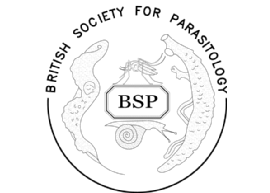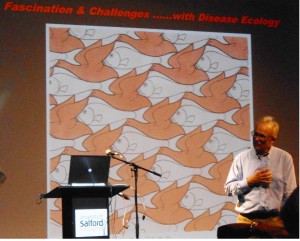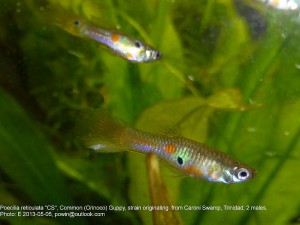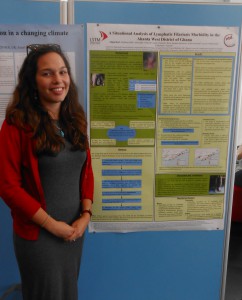

This year’s British Society for Parasitology (BSP) autumn symposium was held in Salford at the highly futuristic Media city, University of Salford. On this occasion the BSP collaborated with the British Ecology Society to focus on the topic of Disease Ecology- ecosystems, wildlife and human health. The outcome was a jam-packed couple of days comprising some interesting talks on a broad range of topics, a heated debate asking the compelling question “Are we all doomed?” and finally an excellent theatrical performance film entitled “Transmission”.

Parasitologists- already working in a highly specialised field- often concentrate on one particular species and narrow down further to a single protein or even a gene, so it was refreshing to take a step back and appreciate infectious diseases with a much wider perspective. It was an opportunity to consider thought-provoking topics such as the effects of predation on host parasitism, the unique transmission ecosystems of Echinococcus multilocularis across China and even how invasive species encountered on our field trips could be hitch hiking home via our wellies!

Professor Peter Hudson (Penn State) opened the event, powering through his recovery from serious “dad dancing” the previous night at his daughter’s wedding. He talked enthusiastically about the development and growth of disease ecology, its role in understanding the dynamics of parasite-host interactions and also in predicting emerging infectious diseases- such as Ebola. Peter Hudson is seen in the photograph opposite using art by Escher to demonstrate the delicate balance of parasite-host relationships.
Jessica Stephenson (Cardiff University) also presented interesting findings on how the predation of Trinidadian guppies (Poecilia reticulate) influences their behaviour and fitness with a knock-on effect on parasitism by Gyrodactylus turnbulli. Her studies showed that highly predated guppies are more likely to shoal, and this increase in interactions between individuals allows the parasite to distribute easily within the population. In contrast, less predated individuals lead more solitary lives and therefore exhibit relatively low parasite prevalence. Her results also showed evidence of sex- and age-specific trait-mediated effects of predators. Her talk was voted best ecology student’s talk at this year’s BSP spring meeting.

Given its applicability to biologists in all fields across the world, for me the most strongly resonating message came from Dr Alison Dunn (University of Leeds). She highlighted the devastating effects that invasive species such as killer shrimp, zebra mussels and American signal crayfish can have on aquatic ecosystems. Such species can survive for up to a fortnight in damp conditions and so are thought to be hitch-hiking a lift on fishing nets, on the bottom of muddy shoes or in the crevices of canoes.
As a consequence the “Check, Clean, Dry” initiative was launched by the government in collaboration with several NGOs to try to tackle the problem. Although the campaign is directed at water sports participants it is important for those of us who frequently conduct field work overseas to operate keeping these basic guidelines in mind:
- Check all gear and clothing for live organisms, particularly in areas that are hard to inspect.
- Clean and wash all clothing, footwear and equipment properly.
- Dry all equipment thoroughly, as many species can live for many days in moist conditions.

There were also an excellent set of posters on an array of topics, from Trichomonas gallinae, a protozoan parasite that causes a horrifyingly disfiguring disease in pigeons and doves, to whole genome sequencing of the rabies virus. Featured opposite is Abigail Best, a recent MSc graduate from the LSTM, Liverpool, presenting her poster on lymphatic filariasis (LF). After spending her summer collecting data in Ghana, she carried out analyses on the prevalence and morbidity of LF, and the management of symptoms. Interestingly, she found that the use of soap and water correlated positively with the severity of lymphodema, and suggested that this was due to more rigorous compliance by patients already suffering badly from lymphodema.
The conference concluded with a premier of the BSP’s new promotional film, which was shot at this year’s spring meeting in Cambridge. It features many big names in Parasitology, as well as more junior scientists and enthusiastic students. The film will feature on the BSP’s website shortly, so watch this space!

Comments